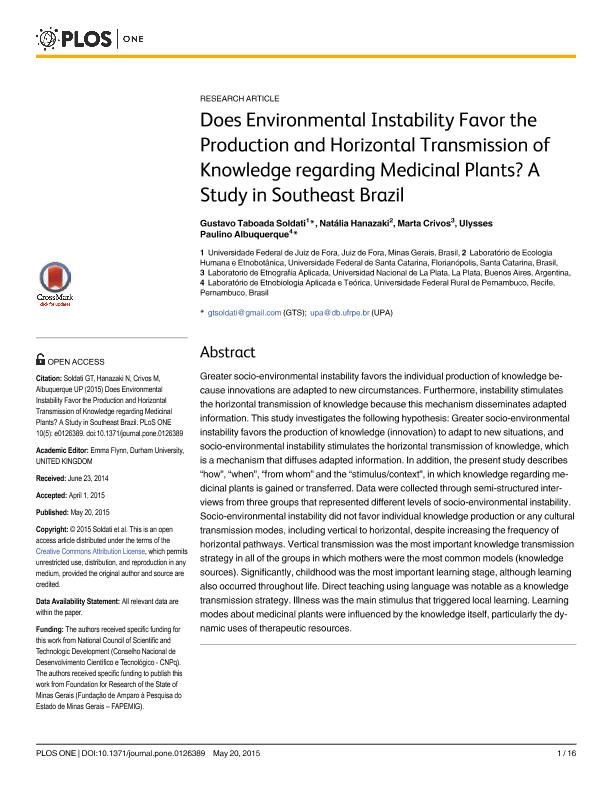Artículo
Does environmental instability favor the production and horizontal transmission of knowledge regarding medicinal plants?: a study in southeast Brazil
Fecha de publicación:
05/2015
Editorial:
Public Library Of Science
Revista:
Plos One
e-ISSN:
1932-6203
Idioma:
Inglés
Tipo de recurso:
Artículo publicado
Clasificación temática:
Resumen
Greater socio-environmental instability favors the individual production of knowledge because innovations are adapted to new circumstances. Furthermore, instability stimulates the horizontal transmission of knowledge because this mechanism disseminates adapted information. This study investigates the following hypothesis: Greater socio-environmental instability favors the production of knowledge (innovation) to adapt to new situations, and socio-environmental instability stimulates the horizontal transmission of knowledge, which is a mechanism that diffuses adapted information. In addition, the present study describes “how”, “when”, “from whom” and the “stimulus/context”, in which knowledge regarding medicinal plants is gained or transferred. Data were collected through semi-structured interviews from three groups that represented different levels of socio-environmental instability. Socio-environmental instability did not favor individual knowledge production or any cultural transmission modes, including vertical to horizontal, despite increasing the frequency of horizontal pathways. Vertical transmission was the most important knowledge transmission strategy in all of the groups in which mothers were the most common models (knowledge sources). Significantly, childhood was the most important learning stage, although learning also occurred throughout life. Direct teaching using language was notable as a knowledge transmission strategy. Illness was the main stimulus that triggered local learning. Learning modes about medicinal plants were influenced by the knowledge itself, particularly the dynamic uses of therapeutic resources.
Palabras clave:
Transmission of Knowledge
,
Socio-Environmental Instability
Archivos asociados
Licencia
Identificadores
Colecciones
Articulos(CCT - LA PLATA)
Articulos de CTRO.CIENTIFICO TECNOL.CONICET - LA PLATA
Articulos de CTRO.CIENTIFICO TECNOL.CONICET - LA PLATA
Citación
Taboada Soldati, Gustavo; Hanazaki, Natalia; Crivos, Marta Alicia; Albuquerque, Ulysses Paulino; Does environmental instability favor the production and horizontal transmission of knowledge regarding medicinal plants?: a study in southeast Brazil; Public Library Of Science; Plos One; 10; 5; 5-2015; 1-16; e0126389
Compartir
Altmétricas




